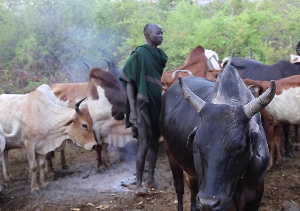For warriors of this ethnic group, drinking cow’s blood gives them strength ahead of battles including the Donga. The Donga battle, otherwise known as the stick fighting festival, takes place after the annual harvest. Warriors from opposing villages engage in this stick fight to show off their strength and masculinity to attract the attention of women watching the fight.
Donga fights do get savagely violent; some warriors die even though it is forbidden to kill a rival. Others lose limbs and eyes. Relatives of warriors who are killed are usually compensated with a woman or 20 cows while those who get injured are not given compensation at all, a report notes. Still, Suri men go all out for the Donga as winners are hailed as heroes and can reportedly choose any local woman as a wife. Some warriors even fight completely naked to show their bravery in front of women.
All in all, what these warriors do not forget to do is to drink the blood of cattle to prepare for the violence expected of battles. According to a report, Suri warriors believe cow’s blood is full of vitamins which will “keep them fit” and help them get stronger. Before the stick fights, for example, a small incision is made in a cow’s carotid artery with a sharp arrow to make it bleed almost two liters of blood.
Ahead of battles, warriors cross a river to wash themselves before decorating their bodies in clay to attract potential partners. Around 20 to 30 men from nearby villages with their massive sticks would then gather on each side for the stick fights. They would dance and sing before selecting the warriors who would be engaging in the fights. The fights are usually refereed and sometimes even staged for tourists. Young women do wear necklaces around the neck that they give to the winners in hopes that they would be chosen.
Numbering about 20,000, the Suri live in small villages made up of about a hundred people each. They grow basic foods such as corn, cassava, beans and cabbage, a report says. Men are often found in cattle camps not too far from their homes. In these camps, caring for cattle is largely done by men and young boys though young girls can also help.
In these camps, the ritual of bleeding cattle for food is practiced, as well as the Donga.
Source: face2faceafrica.com
 Home Of Ghana News Ghana News, Entertainment And More
Home Of Ghana News Ghana News, Entertainment And More





